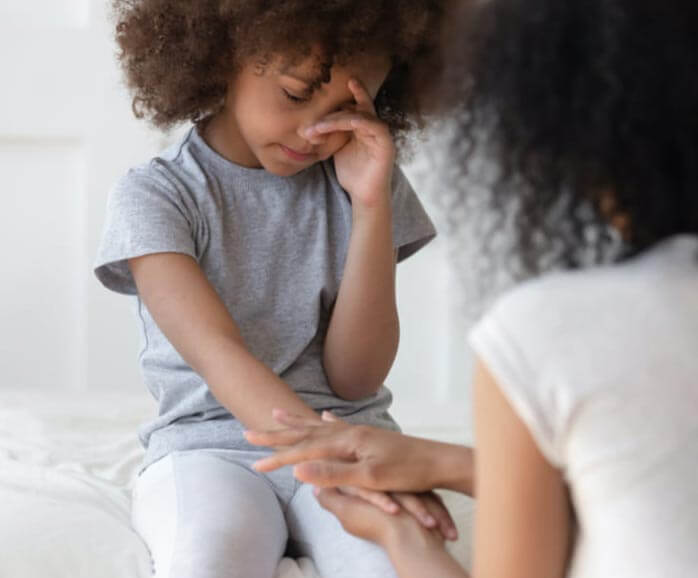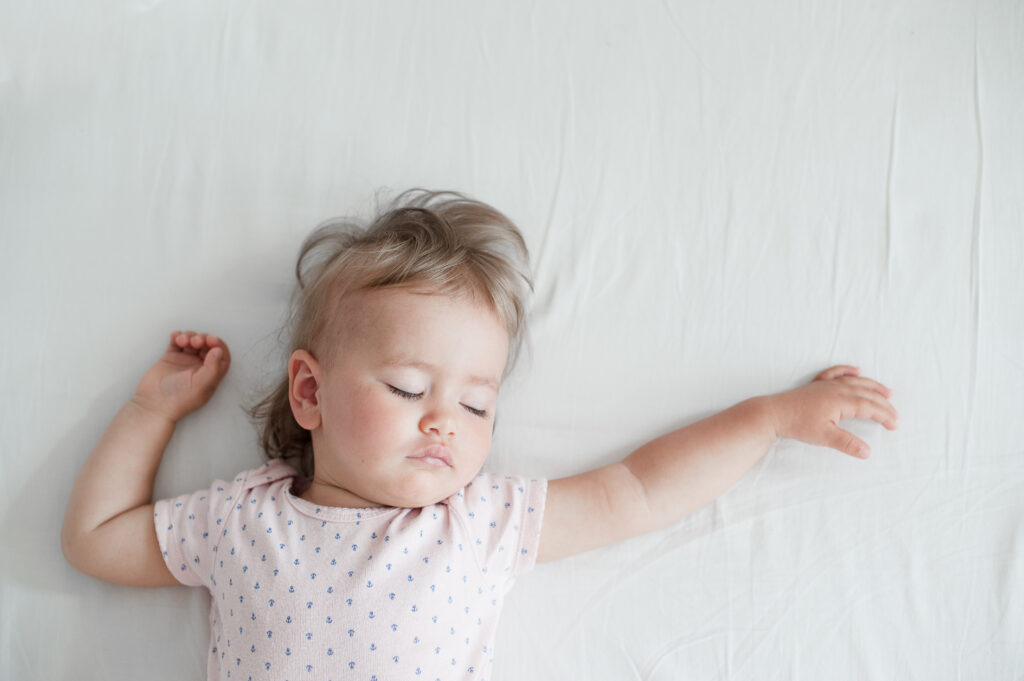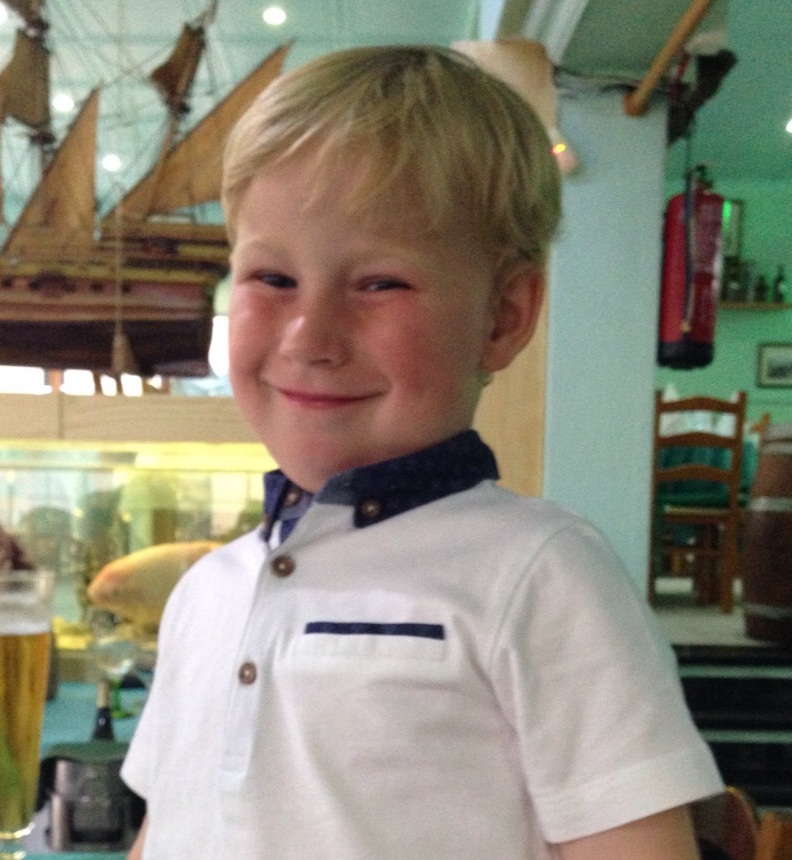In this blog, we’ll explore how anxiety can disrupt children’s sleep patterns, leaving both parents and children exhausted. We’ll uncover the underlying causes of bedtime anxiety and provide practical tips and strategies to help your child find calm and restful sleep.
Anxiety/Worries and Sleep
Anxiety can disrupt children’s sleep for various reasons, creating a challenging cycle that affects both their physical and emotional well-being.
Firstly, anxiety triggers the body’s stress response, leading to heightened arousal and difficulty winding down for sleep. This can result in racing thoughts, increased heart rate, and muscle tension, making it hard for children to relax and fall asleep.
Additionally, anxious thoughts and worries may intensify at night when the distractions of the day fade away, leaving children feeling more vulnerable and unsettled. Moreover, anxiety can manifest in physical symptoms such as stomach aches or headaches, further disrupting sleep. The fear of the dark, separation anxiety, or worries about school or social situations can all contribute to bedtime anxiety, making it a multifaceted challenge to address.
Understanding the underlying causes of anxiety and implementing strategies to promote relaxation and security are essential steps in helping children overcome sleep disturbances caused by anxiety.
Often these fears only surface at bedtime, when the day is over and there are no distractions to divert their thoughts.
So how can you help your young person manage their sleep at this time…..well the good news is there are things you can do to help.

What causes worries or anxiety at bedtime?
There are numerous causes of anxiety in children that can impact negatively on their sleep. These include long-term unresolved sleep issues, overthinking or over-worrying, experiencing vivid and scary nightmares, fear of the dark and monsters, starting nursery or school, family breakdowns and bereavement.
Older school-aged children who struggle to sleep are often perfectionists and academic high achievers. They find themselves in a vicious cycle where they worry about how lack of sleep will affect their work, which stops them from falling asleep and in turn leads to negative thoughts or even fears about sleep itself.
Children with autism and ADHD may have more bedtime anxieties than their peers. Bedtime can be particularly challenging for children with ADHD who have difficulties quietening their racing minds from the stresses or worries about their day.
A typical bedtime
Children with anxiety at bedtime often struggle to fall asleep and can lie awake for hours. They can reappear numerous times in the evening with excuses such as being hungry, thirsty, too hot, too cold or needling the toilet. You take them back to bed, but in no time at all, they are back with more excuses. This process happens night after night leading to cross and stressed parents and an even more anxious child; you all dread bedtime!

You eventually find yourself getting into your child’s bed just to get them to sleep and then in the night they wake and seek you out again to help them get back to sleep. The perfect recipe for a tired and stressed family!
Have a stress-free bedtime that helps your child sleep well
Starting your child’s bedtime routine
- About an hour before your child goes to sleep have quiet time. Tidy away the toys and turn off all screens. Research has shown light from computers, iPads etc. can interfere with the production of the sleep hormone melatonin.
“Talking time”
- This is the time to set aside 10 to 15 minutes of one-on-one calming and quiet time with your child. Ensure you put your phone away and make sure you have nothing else you need to do at this point so you can give your child your undivided attention. At Millpond we often call this “Talking Time”.
- This will give your child the space to discuss any worries or fears they may have and just as importantly means they are less likely to need to bring them up just before you say goodnight.
- If your child doesn’t have anything specific they wish to discuss, as an alternative you could help set a positive tone by discussing 3 positive things about that day. If possible try and find new things each evening. Your child may like to write them in a notepad that you keep just for bedtime.
Get your routine right so your child settles to sleep calmly and happily.
- Initially focus the bedtime routine around the time your child naturally falls asleep; even if this seems late.
- For example, if your child usually falls asleep at 10.00 pm start your routine at 9.15 pm. This way you are allowing 30 minutes for the routine and 15 minutes for them to fall asleep.
- Carry out the same series of steps every night – make this routine your bedtime routine ritual. Having a routine means your child’s body will start to prepare for sleep as soon as you start this process.
- If your child is falling asleep well in 15 minutes, after a few nights, start your bedtime routine 15 minutes earlier. Repeat this pattern, slowly advancing the start time of your routine until you reach the time that works best for your child.
Have a warm relaxing bath.
- Have a warm, relaxing bath lasting no longer than 10 minutes. Keeping the bath to a maximum of 10 minutes means bath time doesn’t become a stimulating playtime. The added bonus is coming out of the warm water allows the body to cool quickly triggering the sleep hormone melatonin.
- Then go straight into your child’s bedroom; going back into the living area at this time will lose the focus and magic of the routine.
Dim the lights.
- Pre-dim the lights in their bedroom, as this will also help with melatonin production. If your child is scared of the dark and requests you leave a light on it’s best to have one that emits a warm amber or orange glow. Turn it on at bedtime and leave it on all night. The warm low-level light will not interfere with their sleep and will offer them the reassurance they need.
Dress for bed.
- Have their night clothes ready for their return from the bathroom so they can quickly get dressed and climb into bed.
It’s time for a story.
- Even if your child can read to themselves, read a quiet calming story and have a cuddle and kiss goodnight then tuck them in with their favourite soft toy so they are warm and cosy.
- Now that they’re drowsy, leave the bedroom so that they learn to fall asleep independently.
I want you to stay.
- Your child may only be able to fall asleep happily if you stay with them. If this is the case you can help build your child’s confidence in falling asleep independently by implementing a slow gradual retreat programme at bedtime.
- If you are currently sitting by the side of your child’s bed as they go to sleep, start by sitting just a little further away. Reassure them you will wait for them to be fully asleep before you leave their bedroom. After 3 to 4 nights, move just a little further away from their bedside; you may only move a foot at a time. Keep repeating this process very slowly moving in small incremental steps until you are out of their room and then along the landing as they go to sleep. This process should take about two weeks to achieve.
Mandy Gurney is the founder of Millpond Children’s Sleep Clinic and has been advising on baby, toddler and school-aged child sleep issues for nearly 30 years. She is a qualified nurse, midwife and health visitor.


